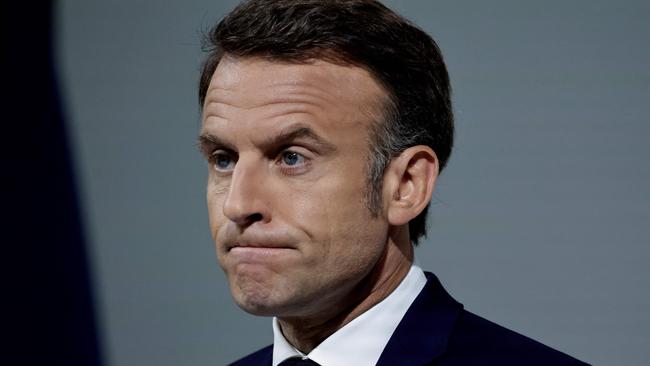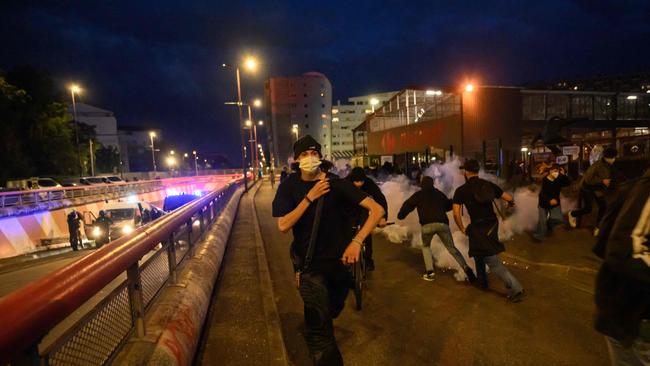
But with France a pivotal player in Europe, and influential in global politics more broadly, Macron’s decision is both important in itself and telling of forces at work in almost all the advanced democracies.
The trigger was the resounding success of the Rassemblement National (National Rally) in last Sunday’s European elections. Although the RN topped those elections in both 2014 and 2019, it did so with a significantly lower share of the vote and having only marginally overtaken its major rivals.
This time, RN’s 31 per cent not only made it the first party to exceed a 30 per cent threshold since 1984, but was twice the vote received by Macron’s own party, which came second. As if that were not humiliating enough, Macron’s party plummeted from its 22.4 per cent vote share in the 2019 European elections to just 14.6 per cent.
That the “Macronistes” would do badly was widely expected: 70 per cent of voters are dissatisfied with Macron’s performance, with more than 40 per cent being extremely dissatisfied. Given that context, one might have thought Macron would downplay the outcome and focus on improving his party’s standing before the 2027 presidential elections.
But Macron is, and has always been, a risk taker. He seems convinced that the electorate will shy away from giving Marine Le Pen the legislative majority she would need to form a government. Rather, he thinks that in France’s two-stage voting process, which, in its second stage, becomes a contest between two (or at most three) candidates, voters will opt for the lesser risk – that is, for his party’s candidates.
Unpacking all of that scenario’s assumptions would take too long. Fundamentally, however, it understates both the extent of the RN’s electoral success and the strength of the factors that underpin it. In effect, the RN did not merely improve its score in its strongholds; it received a plurality of the votes cast in every metropolitan region, securing pole position in those where it previously struggled.
Additionally and crucially, it obtained very high vote shares in all the major cities, with the exception of intramural Paris, and even in a slew of minor centres in which it does not have branches.
Last but by no means least, it dominated all income brackets as well as every age group – including, for the first time, retirees – and perhaps even more importantly, made its greatest gains among women, who were the primary source of its increased share of the vote.

The causes of the RN’s breakthrough are not hard to find. Cost-of-living pressures figure prominently among them, with the soaring price of essentials leading the list.
Even though France’s reliance on nuclear means its generating costs are among the world’s lowest and most stable, the workings of the European electricity market have increased domestic power bills by 70 per cent in five years. As household budgets are slugged by that increase and many others, Dutch ultra-discounter Action has, quite remarkably, become France’s most highly rated retail outlet.
At the same time, voters have mounting fears about law and order. The number of reported assaults occasioning bodily harm has increased by 63 per cent since Macron was first elected in 2017. Meanwhile, the homicide rate has risen by a third, partly driven by increasingly frequent battles between drug-dealing gangs.
And the European election shows that voters remain deeply scarred by the June-July 2023 riots, with the RN recording some of its most impressive gains in those towns where youths, largely of migrant origin, wreaked havoc, burning 6000 vehicles, damaging or destroying 2500 buildings and attacking 258 police stations.
That points to the final, but perhaps most complex, issue, which is migration. In 2023, refugee arrivals reached a record high, while the proportion of refugee applications that were eventually accepted rose by another four percentage points.
France receives fewer asylum-seekers than Italy or Germany. However, French voters know that over the past decade eight million asylum-seekers have arrived on the European Union’s shores, which is the equivalent of a medium-sized EU member state – and they also know the inflow shows no sign of abating. France may account for just 15 per cent of the total, but poorly controlled migration has become increasingly contentious as the relations between France and its Muslim community have soured.
That is not solely because of terrorism. It is also because of the growing gap between that community’s perceptions and those of the bulk of the French population. For example, an absolute majority of Muslim parents believe their daughters should not participate in mixed sporting events, such as swimming lessons; equally, they reject the right of school teachers to show high school students paintings and sculptures of naked women. More than ever before, teachers who offend “Islamic values” by sticking to the national curriculum are subjected to vicious online harassment, if not outright violence.
And the bashing of a young Muslim girl by her schoolmates for refusing to wear a hijab has focused public attention on the rise of intolerance and cultural separatism in the heavily Islamic peripheries of urban areas.
To say Macron has ignored those issues would be unfair; but he veers between acting impetuously and trying to please everyone, confusing the message and muddying policy implementation.
Yet the RN’s electoral success is not simply a reaction to Macron’s missteps. It also reflects the fact that its mayors and regional councillors have been reasonably efficient, while its parliamentary group has performed remarkably well, despite being the least experienced, and is the only one that has a significant number of members of working-class origin.
The recent television footage – which showed the far left’s keffiyeh-clad parliamentarians, who receive 70 per cent of the Muslim vote, shouting Islamist slogans and waving Palestinian flags on one side of the chamber, and the RN’s parliamentarians, with ties or scarfs bearing France’s national colours, firmly but calmly calling them out on the other – certainly didn’t harm the RN’s image.
Together with the disunity that has plagued all of the RN’s rivals, including Macron’s own party, those signs of seriousness help explain why more than half of French voters now consider the RN capable of being a party of government.
None of that means the RN will secure a parliamentary majority. Rather, regardless of Macron’s wishes, the likely outcome remains a parliament in which no party is capable of governing on its own.
But if there is a lesson to be drawn from the French experience, it is that today’s voters swiftly punish leaders who shy away from tackling tough issues because they want to walk all sides of the street. The sooner our own government learns that lesson, the better.








The polls were, for once, remarkably accurate. What no one had predicted was that Emmanuel Macron would immediately dissolve the National Assembly (France’s lower house) and call a snap legislative election.